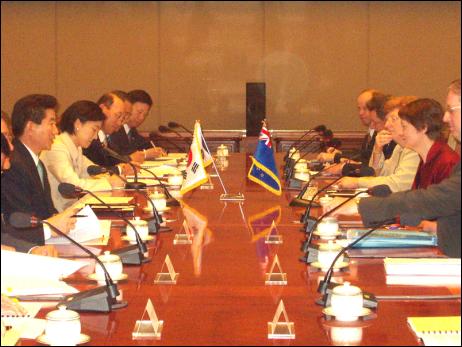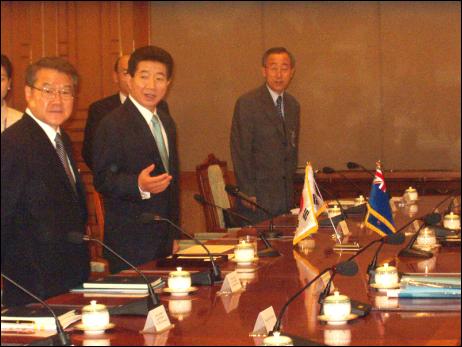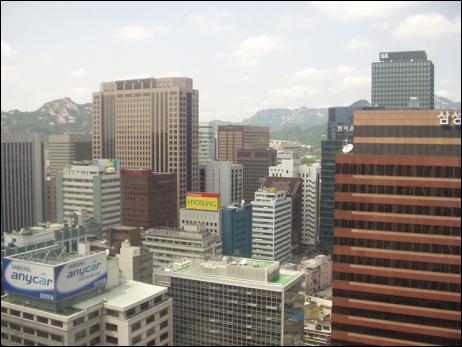Eve Korean Armistice 50th: Kissinger To Meet NZ PM
By Selwyn Manning – In Seoul, Korea
New Zealand has been at the centre of a series of high powered talks between China, South Korea over a diplomatic crisis over Korea's advancement to Nuclear weapon status. And now it is revealed NZ Prime Minister is to meet with the USA's Henry Kissinger. Is Kissinger to carry a message back to Washington? Or is the meeting merely a handshake and grin ceremony?
New Zealand Prime Minister Helen Clark will meet former U.S. Secretary of State Henry Kissinger today (Saturday at 7:30pm NZ Time) in Seoul.
Kissinger is the USA’s official representative at the 50th anniversary of the Korean Armistice Agreement. Helen Clark said, Friday afternoon in Seoul, that the ‘unofficial’ discussions are likely to centre on North Korea and broader security issues.
Clark met yesterday (Friday) with South Korea President Roh where the two leaders agreed that dialogue with North Korea ought to be advanced. Roh said after the meeting: “The Korean Government will pursue a peaceful and prosperous policy aiming at bringing peace to the Korean Peninsula and prosperity to the whole Northeast Asia… We will resolve the North Korea problem peacefully through dialogue.”

Helen Clark and President of South Korea Roh met at the Blue House, Government Buildings in Seoul today to discuss trade, and regional security, namely, North Korea.
Clearly Clark favours China to facilitate this dialogue with North Korea over the USA, and is buoyed that bilateral talks between China and North Korea could resume in Beijing within weeks.
Clark met the seventh ranking member of the Chinese Government, Mr Li Chang Chun, last Friday (July 18) in New Zealand. While details of that meeting are sketchy, it is believed China presented a sound case for New Zealand supporting its wish to lead diplomatic talks rather than the USA. Certainly that is the option that Helen Clark now favours.
When asked in Seoul if she harboured concerns should the US lead North Korea bilateral talks, she said: It is important for China to lead these talks.
Her comments came after a late-afternoon meeting between Clark and South Korea’s Minister of Unification. South Korea, she noted, believes there to be a “slow attitude change” within North Korea in favour of economic reform. The Unification Minister had expressed hope, she said, that North Korean citizens could be employed by South Korean ventures within two years. Helen Clark emphasised the need for change, detailing how North Koreans are largely impoverished.
Clearly China is well positioned to avert an unnecessary escalation of finger pointing between the USA and North Korea.
China contributes an undisclosed administrative annual aid purse to North Korea and has been encouraging North Korea to embark on ‘tiger’ reforms designed to open up the country to joint venture arrangements as a way of bringing infrastructure development and opportunity to its peoples.
Tension on the Korean Peninsula has intensified since, in September 2002, U.S. President George W. Bush highlighted North Korea as a country within what he termed the “Axis Of Evil”.
The Bush Administration then detailed in its National Security Strategy document, specific scenarios where the U.S. would consider pre-emptive military attack against nations it considers within this Axis of Evil.
North Korea retaliated aggressively, intent to equip itself with nuclear weapons and demonstrate means of striking nearby neighbours Japan and South Korea with medium range warhead carrying missiles should the U.S. threat be actioned. The North Korean government appears to calculate that the United States is more likely to invade those ‘Axis’ countries that are not nuclear armed, as it did in Iraq in March, than those that show a willingness to use nuclear weapons should an invasion or strike be imminent.
Sources here say South Koreans are divided between Pro-US and Anti-US views. The view that South Korea is totally pro-USA is not entirely correct. George Bush’s Axis Of Evil speech was viewed as foolhardy. Most believe the President of the United States of America ought to have known better. Tensions too are quick to surface. Thousands protested here against the USA recently when a US Military Armed Personnel Carrier ran over and killed a South Korean child.

Republic Of Korea President Roh [centre] says tensions between North and South Korea have eased between in past months, despite news reports that North Korea has advanced its nuclear weapons programme. He says such reports negatively effect the South’s economic programme.
In South Korea, tensions between the North and USA are seldom off the front pages of the press. But in Seoul there’s little outward concern for diplomatic threats from the North, nor overt awareness that North Korea recently moved artillery closer to the border, and is a fuel-rod-singe away from creating plutonium for nuclear weapons designed to strike the heart of this most beautiful of cities, Seoul, and beyond.
Here in Seoul, 14 million people enjoy a paced, vibrant, high-tech way of life in a relatively clean city proud of nationhood and achievement.
Here it is hot, steamy, mid summer. Walking around Seoul attractive faces flow past, smiling, welcoming, happy to accept visitors. Scents of culinary delights waft about these crowded streets, challenged occasionally by moist breaths determined to escape from fishy alleys and tight back-entrance ways.

Looking about the Seoul skyline you have to look hard to see US multinational brands. South Korea has mastered its own neon culture with huge moving picture advertisements screening from the top of skyscrapers - towering statements of developed-economy achievement. The brands speak as much about national pride as commercial brand awareness. Samsung, the Seoul Finance Center, Hana Bank, Professional Hyosung, Hyundai, Ace “from Korea to the world” dominate. But beneath the surface Americana is here, in concept if not culture. If you look hard you’ll find KFC, a golden arch, Coca Cola, Nike, Starbucks.
Not obvious, but factually, the United States is both historically and currently interlocked in South Korean security and stability.
Are symbols important in such times? Perhaps. And this brings us back to Kissinger.
Tonight, a buoyed Helen Clark described Kissinger as “a legend” in his own right. Kissinger played a prominent part in Middle East peace talks in the early 1970s and brokered an ease in USA-China relations, culminating in a visit to China by Richard Nixon in February 1972, a visit highlighted by talks between Nixon and Communist Party Chairman Mao Zedong.
Is there more to Clark's relish centering on plans to meet the man who was Secretary of State under disgraced U.S. President Richard Nixon - Kissinger, the man who is considered by many to be partially responsible for hundreds of thousands of deaths in Chile, El Salvador and in Cambodia during the Vietnam War?
This considered, Henry Kissinger is an ‘interesting’ envoy chosen by the Bush Administration to represent the United States at this weekend’s 50th anniversary of the Korean Armistice Agreement.
If there are truths to rumours that Helen Clark seeks a high powered UN career after her rule in the New Zealand Executive concludes, then maybe there is sense to all this diplo-positioning and backroom brokering in regions far from New Zealand's shores.
But if such rumours are off the mark, then in reality it simply proves New Zealand's just a sideline-spectator in a sport of a most serious and clandestine kind.


 Keith Rankin: The Aratere And The New Zealand Main Trunk Line
Keith Rankin: The Aratere And The New Zealand Main Trunk Line Gordon Campbell: On The Mock Horror Over Political Profanity
Gordon Campbell: On The Mock Horror Over Political Profanity Ian Powell: Predictable Smear On Senior Doctors
Ian Powell: Predictable Smear On Senior Doctors Binoy Kampmark: Trump, Planes And The Arabian Gulf Tour
Binoy Kampmark: Trump, Planes And The Arabian Gulf Tour Ramzy Baroud: Gaza's Graveyard Of Illusions - How Israel's Narrative Collides With Military Failure
Ramzy Baroud: Gaza's Graveyard Of Illusions - How Israel's Narrative Collides With Military Failure Jeremy Rose, Eugene Doyle, Ramon Das: Radio New Zealand’s Report On Its Israel-Gaza Coverage Is Not Credible
Jeremy Rose, Eugene Doyle, Ramon Das: Radio New Zealand’s Report On Its Israel-Gaza Coverage Is Not Credible